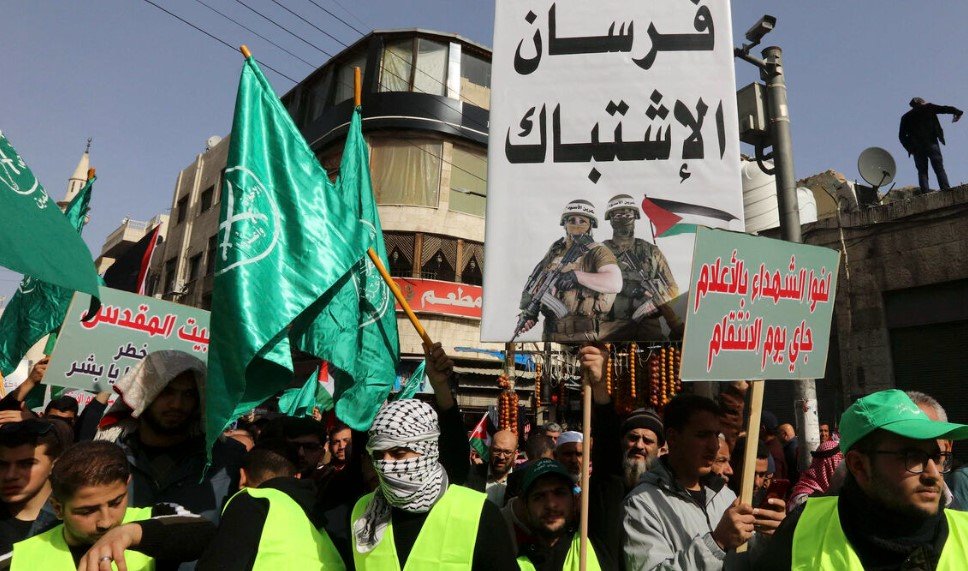Jordan’s recent decision to ban the Muslim Brotherhood, following revelations of a plot to destabilize the kingdom, offers a unique opportunity for former President Donald Trump to push forward his Middle East diplomacy by bringing Saudi Arabia into the Abraham Accords.
Jordan’s Strong Stance Against the Muslim Brotherhood
Jordan’s move to outlaw the Muslim Brotherhood, one of the most influential and controversial Islamist movements in the Middle East, is a bold and significant action. The Jordanian government, led by King Abdullah, has long been wary of the Brotherhood’s influence in the region. Last week’s decision to ban the organization follows the exposure of plots involving the Brotherhood aimed at destabilizing the kingdom. The ban comes at a time when the group’s activities have increasingly become a threat to Jordan’s stability, and this step signals a stronger commitment to protecting the kingdom from extremist ideologies.
The Muslim Brotherhood, which has existed since the early 20th century, has a long and complicated history in the Middle East. Originally founded in Egypt, the group has spread its influence across much of the Arab world, including Jordan, where it has maintained significant political sway for decades. The Brotherhood’s goals, which include the establishment of an Islamic state governed by Sharia law, have often put it at odds with secular regimes and Western-backed governments.

King Abdullah’s crackdown on the Brotherhood isn’t just about domestic security—it’s also a reflection of broader geopolitical realities. Jordan shares borders with Israel, Syria, Iraq, and Saudi Arabia, and has long been a key player in Middle East diplomacy. The country’s recent move against the Brotherhood is not only a response to internal threats but also a signal to the international community that Jordan is committed to safeguarding its sovereignty from the destabilizing forces of extremist movements.
Historical Context and Modern Implications
The Muslim Brotherhood has a history of violent extremism, dating back to its origins in the early 1900s. In the 1920s, the Brotherhood’s militant branch, known as “al-Ikhwan,” caused major disruption throughout the Arabian Peninsula. The group’s influence even reached the point where British officers like John Bagot Glubb, who later commanded the Jordanian Arab Legion, were tasked with confronting them. Al-Ikhwan’s brutal approach to establishing its version of Islam through violence and terror caused widespread fear across the region, including among fellow Muslims.
Fast forward to the 21st century, and the Brotherhood has morphed into a significant political force with international implications. Its Palestinian branch, Hamas, has led to countless conflicts with Israel, while its ties to groups like Hezbollah and Iran have contributed to broader instability in the Middle East. While these connections are not always publicly acknowledged, it is clear that the Muslim Brotherhood’s network is closely intertwined with Iranian-backed militants, further complicating the region’s security landscape.
King Abdullah’s decision to act against the Brotherhood comes at a time when Jordan, along with many Arab states, is concerned about the growing influence of Iran in the region. The kingdom has long been wary of Iran’s intentions, and this latest move is a clear signal that Jordan will not tolerate groups that could potentially align with Tehran’s agenda. By banning the Brotherhood, Abdullah is also sending a message to other regional actors that Jordan is committed to preventing the export of violence and instability into his country.
Why Trump Should Seize the Moment
With the banning of the Muslim Brotherhood, Jordan has taken a significant step toward consolidating its internal security and asserting its influence in the Middle East. This moment presents a perfect opportunity for Donald Trump to further his Middle East peace efforts, particularly by extending the Abraham Accords to Saudi Arabia.
When the Abraham Accords were signed in 2020, they marked a historic shift in Middle East diplomacy, as Israel, the United Arab Emirates (UAE), and Bahrain normalized relations. These agreements demonstrated that traditional Arab hostility toward Israel could be overcome through cooperation and mutual interests. Trump’s foreign policy accomplishments were instrumental in creating the framework for these agreements, and there’s no reason why this momentum can’t be leveraged to include Saudi Arabia.
Saudi Arabia, under Crown Prince Mohammed bin Salman (MbS), has shown increasing openness to the idea of establishing formal ties with Israel. While a full diplomatic agreement has not yet materialized, the groundwork laid by the Abraham Accords creates a foundation on which further progress can be built. Trump, with his ties to the Saudi leadership, is uniquely positioned to play a crucial role in bringing the Kingdom into the fold. By focusing on shared interests—such as countering Iranian influence and improving regional security—Trump could push for Saudi Arabia to join the Abraham Accords, thereby achieving a level of stability and cooperation in the Middle East that has not been seen in over a century.
The strategic benefits of bringing Saudi Arabia into the Abraham Accords would be immense. Not only would it formalize a relationship between two key regional players, but it would also strengthen the broader regional alignment against Iran. Additionally, it would provide a significant diplomatic victory for the Trump administration and demonstrate his ability to continue shaping Middle East diplomacy even after leaving office.
A Critical Moment for Trump to Lead
Jordan’s bold move against the Muslim Brotherhood is not only a sign of growing regional security but also an opportunity for former President Trump to advance his vision for peace in the Middle East. By working to bring Saudi Arabia into the Abraham Accords, Trump can cement a legacy of Middle East stability and cooperation. As the region continues to evolve, the time is now for leaders to take bold steps, and Jordan’s actions provide the perfect backdrop for further progress in this crucial diplomatic effort.
